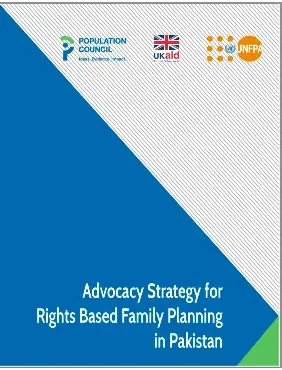Pakistan’s population has grown by 70 million over the last two decades, making it the fifth -most populous country in the world with a tally of more than 208 million people. The country’s alarming population growth rate runs concurrent to the low prevalence of family planning usage among the country’s youth, particularly in poor communities, despite a high expressed need for contraception and other family planning services. Since a large population has a profound, cross-sectoral impact on the country’s socioeconomic growth, Pakistan is in need of transformative change to boost family planning use in order to achieve 12 of the 17 Sustainable Development Goals (SDG2030).
This advocacy strategy outlines three focus areas, which work in tandem with each other, to create a favorable legislative and operational setting to foster sustained commitment aimed at resolving the population issue. These focus areas create a synergy to prioritize family planning services and population dynamics in national development planning to expand service delivery and access for all Pakistanis (especially the poor) and to build the country’s internal capacity to produce reliable population data and analysis that can, in turn, fuel evidence-based policymaking for sustainable development. Evidence generation and its appropriate use are part and parcel of this advocacy strategy.
Each of the three strands address an existing shortcoming in family planning-related advocacy in Pakistan thus far. The first strand is geared towards generating and sustaining political will at the highest level of the national and provincial governments; amassing support from administrations to translate the political consensus into policy direction structural reforms to reduce national fertility and to strike a balance between population size and available resources. The second strand works at the implementation level to bridge gaps in access to family planning services through healthcare providers and public-private partnerships. There is a high unmet need for family planning, especially among women in rural areas of the country, that requires sustained support over the course of the next decade. The third strand focuses on instituting centers of knowledge production to collect, analyze, and disseminate demographic data regularly, which is instrumental for policymaking and for educating the public about the cross-sectoral impact of a large population.
This national strategy seeks to engage a set of disparate stakeholders that include political leaders, bureaucrats, family planning service providers, researchers, religious leaders, civil society, the traditional media, social media, and other public figures to consolidate efforts towards creating a sociopolitical environment that demands immediate action to improve family planning use, and by extension, Pakistan’s development indicators.


